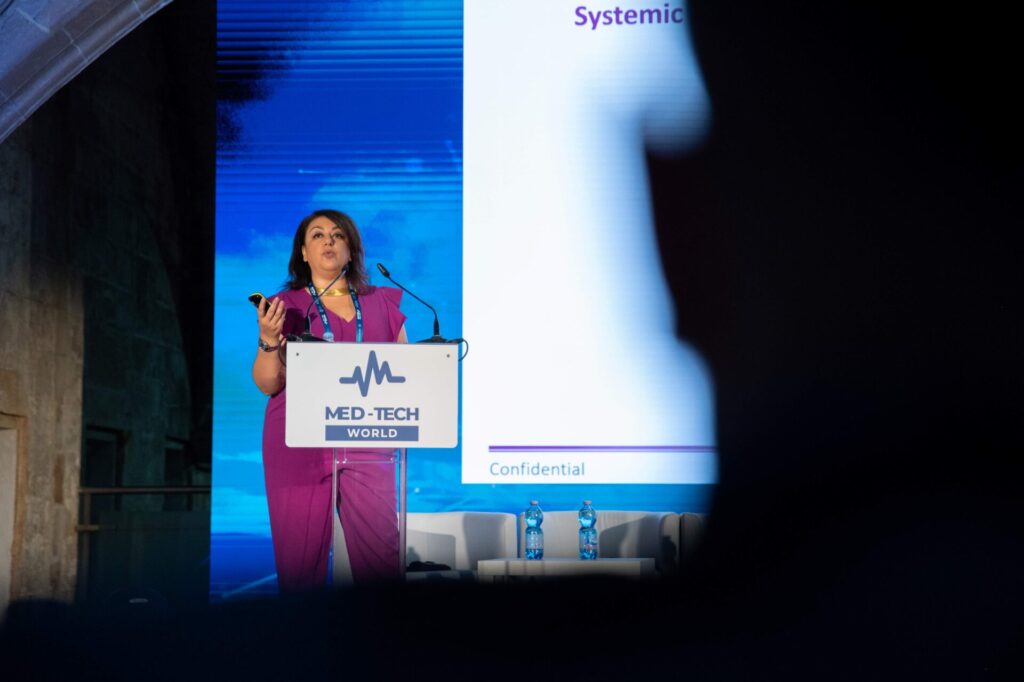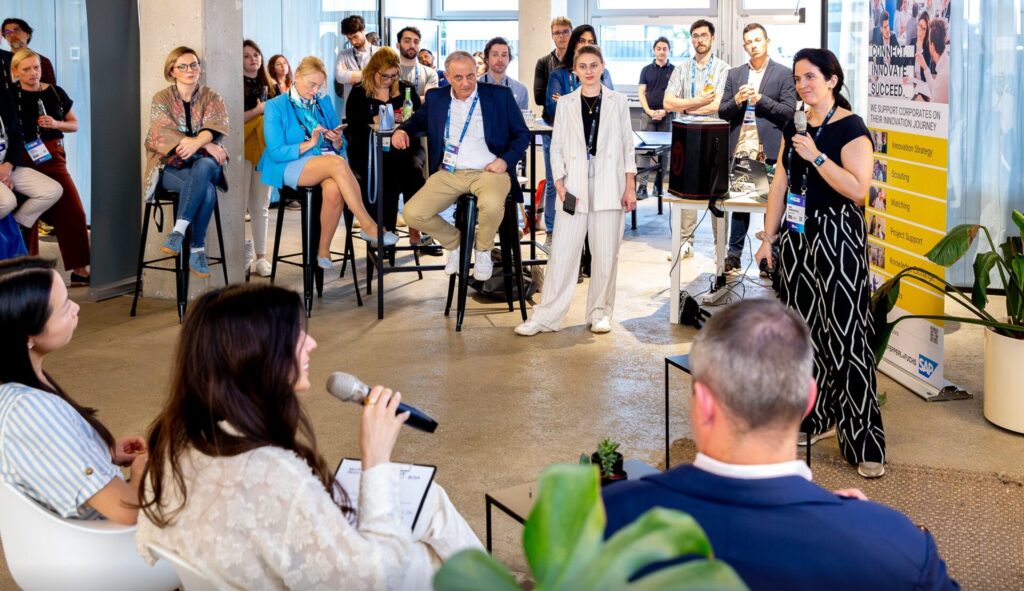
Matthew Calleja
22nd April 2024
The Emirati approach to a healthier future – MedTech World Dubai 2024
“Our strategy’s biggest selling point is that we’re aiming for value-driven incentives over sheer volume.”
– Dr Khulood Mohamed Alsayegh, Head of Clinical Standards and Guidelines, DHA
UAE is driving MedTech innovation
Nestled in the heart of the Middle East, the United Arab Emirates, with its vibrant epicentre in Dubai, has firmly established itself as a trailblazer in global medical technology and digital health.
Beyond its renowned oil wealth, what innovative concepts and trailblazing technologies do you think are driving this transformation in the healthcare landscape?
From advanced telemedicine platforms to cutting-edge AI diagnostics, the UAE embraces digital transformation to sculpt a healthier tomorrow.



At the recent MedTech World Roadshow in Dubai, Dr. Khulood Mohamed Alsayegh, strategically positioned as the Head of Clinical Standards and Guidelines at the Health Regulation Sector of the Dubai Health Authority, illustrated how the UAE is leading the charge in MedTech innovation.
Dr. Alsayegh delved deeper into the intricacies of enhancing patient experiences, navigating the complexities of digital health data, and advocating for ethical AI practices. Her keynote illuminated the ongoing fusion of digital health and artificial intelligence (AI) within Dubai’s healthcare ecosystem.
Patient-centric AI to mitigate data intricacies
“In healthcare, simplicity isn’t guaranteed; we’re dealing with data that’s highly intricate and delicate. Despite our high hopes, tossing AI into the mix doesn’t magically untangle the knots.”
Acknowledging the growing role of artificial intelligence (AI) in healthcare, Dr. Alsayegh highlighted the intricate nature of integrating AI into existing healthcare frameworks. She underscored the importance of data privacy, ethical considerations, and patient-centred design in harnessing the full potential of AI technologies.
Moreover, Dr. Alsayegh addressed the Dubai Digital Strategy. Spanning two years, the strategy aligns with healthcare and international strategies. Emphasising personalised care and patient involvement, it’s a cornerstone for UAE’s future.
Open to innovative ideas, the strategy prioritises enhancing patient experiences and leveraging AI for evidence-based practices. Tailoring solutions to individual needs, it fosters patient-centric care, involving patients in technology development. In this digital journey, patients aren’t just central but an integral part of shaping healthcare innovations.
“Let’s slice through the clutter: is this tech truly revolutionary or just surface-level dazzle? We’re advocating for evidence over empty pledges. Every innovation must deliver tangible benefits to the patient. It’s about meaningful progress, not mere embellishments; let’s prioritise impactful advancements.”
Case in Point: Dubai’s telehealth solution
As an example, Dr. Alsayegh illustrated the Emirati government’s telehealth solution amid the pandemic.
In development, the government emphasised the need for preventive measures, shifting focus to self-care and prevention rather than disease burden. Technology must align with UAE culture and requirements to be effective, with the ultimate goal being a digitalized patient journey, empowering patients with self-monitoring, diagnostics, telehealth, and home healthcare access.
The doctor underscored the importance of post-telehealth consultation care after the initial phase as an integral part to placing the patient’s needs at the centre of the procedure.
“After the telehealth consult, it’s not over. Post-care, home health support is vital for patient well-being and preventive measures.”
While progress is evident, alignment with patient journeys remains crucial. The doctor also recounted the hurdles encountered during the pandemic’s telehealth platform rollout.
“Patient adoption lagged, despite prompt availability, so we launched enrollment drives and solicited feedback to boost engagement.”
As telehealth evolves as a cornerstone of healthcare delivery, Dr. Alsayegh stressed the imperative of overcoming these initial barriers to unlock its transformative potential fully. By prioritising patient-centric design and usability, healthcare providers can ensure telehealth’s seamless integration into routine care pathways, offering patients greater convenience and accessibility while optimising resource utilisation in the healthcare system.
Innovating with ethics in mind
“When designing with patients and ethics in mind, we must ask: Does it serve the patient? Do they know what their treatment entails? Is it practical and evidence-based, or just flashy?”
Dr. Alsayegh stressed the importance of transparency in healthcare, particularly regarding AI ethics. Patients should be informed about the use of AI in their care to ensure transparency and trust. She underscored the necessity for communication among physicians, regulators, public health sectors, and healthcare providers to enhance transparency. This transparency facilitates data analysis, enabling the identification of best practices and ultimately improving patient outcomes.
A spirit of collaboration is called for, as she illustrated the importance of sharing successful practices in the UAE to foster innovation and learning within the healthcare community. This collaborative approach encourages a cycle of feedback, learning, and improvement, ultimately enhancing patient outcomes and driving innovation forward.
As can be deduced from the attempt to incorporate telehealth on a national scale, and many similar like it happening across the globe, Healthcare providers are now facing the challenge of transitioning to telemedicine. The term “teledoctor” may become obsolete, replaced by a standard practice incorporating telehealth. Additionally, AI integration shifts roles toward quality of life advisors, enriching patient care.
A quality of life advisor oversees data and technology, ensuring accountability alongside AI. Complete reliance on AI heralds a healthcare revolution, necessitating human oversight for accountability.
“Ultimately, we’re the ones supplying data to technology. It’s crucial we comprehend, interpret, and communicate outcomes clearly to patients.”
This shift demands heightened tech literacy among healthcare professionals, even incorporating it into residency programs. Emphasising value over volume, insurance must adapt, moving beyond fee-for-service models. Aftercare following consultations is paramount.
“Our strategy’s biggest selling point is that we’re aiming for value-driven incentives over sheer volume. Insurance must evolve beyond fee-for-service models, emphasising comprehensive care packages.”
Come say “Hi!” in London

Join us for the upcoming MedTech World event in London, in collaboration with Queen Mary University, on May 29, 2024.
Held at the Perrin Lecture Theatre in the Blizard Building, Whitechapel campus, this promises to be a day filled with innovation and inspiration. Don’t miss out on the opportunity to be part of cutting-edge discussions and interactive sessions in our modern facilities and breakout rooms.






